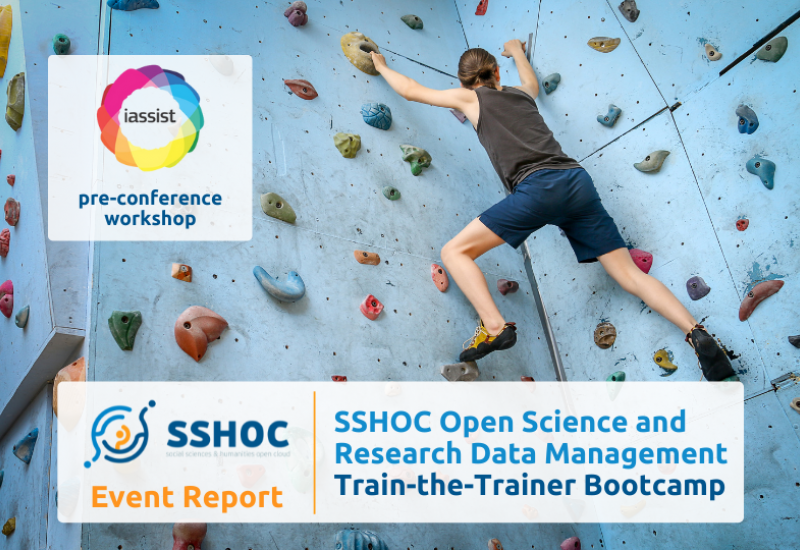
- Social Sciences & Humanities Open Cloud
Highlights from the SSHOC Open Science and Research Data Management Train-the-Trainer Bootcamp

Date:
12 July 2021
Open Science and Research Data Management Training - Creating Interactive Sessions and Preventing Worst Case Scenarios
Do you deliver Open Science and Research Data Management (RDM) training? Are you interested in integrating tools and creating engaging training sessions? Are you looking to prepare in-depth sessions and avoid any disasters? The SSHOC Open Science and Research Data Management Train-the-Trainer Bootcamp held on Monday 10th of May and Wednesday 12th of May 2021 was set to aid trainers in finding resources and tools they can re-use in their training planning and activities. This blogpost reviews the highlights of the bootcamp.
Open Science and Research Data Management Bootcamp
The bootcamp was organised by SSHOC project partners Data Archiving and Networked Services (DANS), Ligue des Bibliothèques Européennes de Recherche (LIBER) and the UK Data Service (UKDS), with guest speakers from the Digital Curation Centre and the Electronic Information for Libraries (EIFL). It consisted of two sessions, each of two hours and was held as part of the International Association for Social Science Information Service and Technology (IASSIST) 2021 pre-conference workshops. IASSIST, founded in 1974, is an international organization of professionals working with information technology and data services to support research and teaching. The IASSIST 2021 Global Virtual Conference (GVC) was held between 18th and 20th May 2021, with all the workshops hosted the week prior.
Tatsiana Yankelevich, Training Coordinator at LIBER kicked off the bootcamp with an interactive introductory session. While we were asked to draw a cat sitting on a chair looking outside of a window most of us ended up drawing wonderful logos and snowmen. This exercise stressed how important detailed instructions are, and especially when trying to integrate tools in your training, how important it is to prepare materials that are easily understandable and followed by everyone.

Anca Vlad, Hina Zahid and Cristina Magder from UKDS presented two tools for assessing numeric data. The presentation looked at QAMyData, a data health check tool which enables researchers to assess the quality of their data and supports repositories and archives in setting up a health profile for data accepted. The presentation also included a quick glance at statistical disclosure control freeware with a focus on the sdcMicro Graphical User Interface, the tool of choice at UKDS.
Linas Cepinskas from DANS and Joy Davidson from the UK's Digital Curation Centre gave an overview of the FAIR-Aware tool. This is a non-disciplinary focused online tool developed by the FAIRsFAIR project. The tool can be adapted by different communities for their own use. The tool helps researchers and data managers assess how much they know about the requirements for making datasets findable, accessible, interoperable, and reusable (FAIR) before sharing them.
Ricarda Braukmann (DANS) showcased the DANS Data Game, which gives a great interactive overview of the common and most used research data concepts. The game was produced for the 15th anniversary of DANS and the idea of the game is to play smart and collect as many sets of four cards as possible, by asking between players.
Iryna Kuchma (EIFL) concluded the first workshop day with a didactics session looking at available materials from FOSTER. The FOSTER e-learning platform is a portal that gathers together the best Open Science resources. It is a great resource for those aiming to learn more about Open Science.
How to best assimilate new information? Homework time
Ellen Leenarts from DANS introduced the bootcamp homework which participants have had to prepare in between the two workshop days.
The main aim of the homework was to give participants time to investigate the tools and practices presented and for them to create a structure for a new training session that integrates one of the tools presented. Participants had to think how integrating a tool would affect their overall training design including learning outcomes, schedule, number of trainers/moderators, audience etc. Each participant was asked to complete a collaborative document shared with everyone for suggestions, feedback and knowledge exchange.
The homework has also asked participants to prepare for worst case scenarios. Five disasters have been prepared:
- The week before a session, (almost) no one has registered.
- The main or one of the main trainers is ill or otherwise unexpectedly unavailable at the time of the training.
- The tool you have integrated is being updated and is off line at the time of the training and not available for demonstration or training or use.
- Many more participants show up for your online training than you anticipated.
- The participants have many more questions than you thought they would have, and not all questions seem relevant to all participants (diverse background)
Breakout rooms, lively discussions and feedback

The second day of the bootcamp was focused on breakout rooms in which participants had a chance to discuss how they would like to integrate a tool in their training and what that would mean for their planning. The breakout rooms were divided by the tools participants wanted to use allowing for lively discussions and informed ideas exchanges. Preparing the homework has facilitated informed discussions and allowed everyone to contribute and clarify any questions that might have arised while preparing it. Not only have the participants found the breakout rooms inspiring and of use for their future training planning, but the speakers have gathered valuable feedback looking to implement new techniques themselves.
Next steps
Have you missed the event and are interested in the tools and presentations? As we are keen for others to use open source resources while implementing best practices in their training, the slides and the homework materials are available through Zenodo.
If you have feedback on specific tools, would like to integrate either in your training session we would love to hear from you. Please don’t hesitate to contact us at training@sshopencloud.eu.
